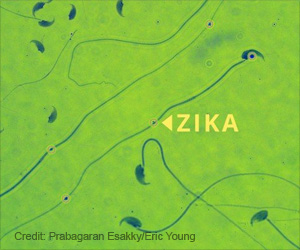COVID-19 might impact the fertility of men by damaging their sperm quality. Thisstudy provides the first direct evidence to date that COVID-19 infection impairs semen quality and male reproductive potential.
Highlights :
- COVID-19 might have negative effects on the fertility of men by increasing sperm cell death, inflammation, and oxidative stress
- Experts outside of the study are skeptical about the study's conclusion and urge caution in overgeneralizing the results
- Long-term research is required to obtain proper results and generalize the findings of the study.
Read More..
Findings showed that in men diagnosed with COVID-19, the sperm cells showed a significant increase in inflammation and oxidative stress (a chemical imbalance that can damage DNA and proteins in the body).
While all men were still fertile, sperm concentration was reduced by 516%, and sperm mobility dropped by 209%. Sperm cell shape was also altered by 400%, resulting in problems in moving through the cervix and uterus.
Maleki explained that these effects on sperm cells are associated with lower sperm quality and reduced fertility potential. He added that although these effects improved over time, they remained significantly and abnormally higher in the COVID-19 patients, and the magnitude of these changes was also related to disease severity.
“The male reproductive system should be considered a vulnerable route of Covid-19 infection and declared a high-risk organ by the World Health Organization," said Maleki. However, experts outside of the study are skeptical about the study's conclusion and urge caution in overgeneralizing the results.
Dr ChannaJayasena, consultant in reproductive endocrinology and andrology, explains that being ill from any virus can temporarily drop sperm count (sometimes to zero) for a few weeks or months. This makes it difficult to work out how much of the reductions observed in this study were specific to COVID-19 rather than just from being ill.
Findings of the study also showed much higher levels of ACE2 enzymatic activity in menwith Covid. This enzyme is the protein that provides the entry point for the COVID-19 virus to attach to and infect human cells.
The virus uses ACE2 receptors to gain access to the tissues of the lung. However, Pacey comments that since ACE2 receptors are also found in the testicles, it is not surprising that Covid-19 might impact the male reproductive system.
In addition, Alison Murdoch, head of Newcastle Fertility Centre, says, "It is important to note that there has been no evidence of Covid-19 virus in the semen and that there is no evidence that the virus can be transmitted via semen."
After reviewing around 14 studies on this topic, Pacey concluded that any measurable effect of coronavirus on male fertility was probably only slight and temporary.
He adds that other factors, such as the use of medications to treat the virus, could have also influenced the study’s findings, which was even acknowledged by the authors.
Sheena Lewis, a professor emeritus, pointed out that the men with COVID had substantially higher body weight and several therapeutic treatments. Obesity is known to reduce sperm quality, and the treatment may have also affected sperm quality, rather than COVID itself, she said.
Alison Campbell, Embryology Director, also pointed out that the men recovering from Covid were treated with corticosteroids and antiviral therapies, while the control group was not, which could have skewed the results.
She cautions: "Men should not be unduly alarmed, since there is currently no definitive evidence of long-lasting damage caused by Covid-19, to sperm or male reproductive potential."
Pacey also comments that since sperm production takes roughly around three months to be completed from start to finish, the study ended 30 days too soon. “It would have been more useful to see whether there was a difference at 90 days between the two groups.”
Reference:
- Evaluating the impact of COVID-19 on male reproduction - (https://rep.bioscientifica.com/view/journals/rep/161/2/REP-20-0523.xml)
Source-Medindia














